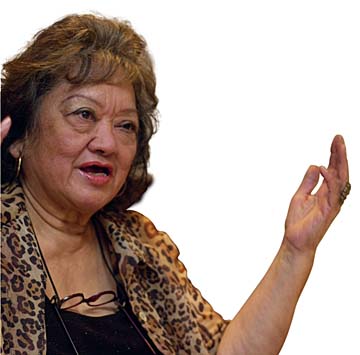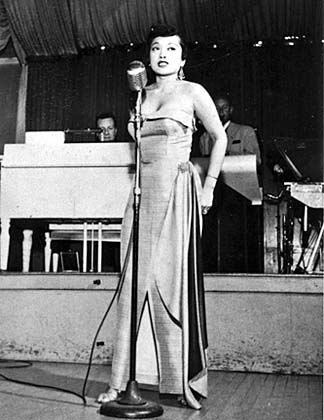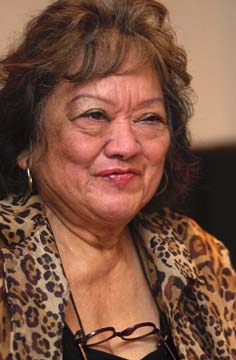

|
First Sunday Mark Coleman |
Entertainer, radio talk-show host, PR maven, political spouse. She's been all of that and more. Teddi Medina's latest incarnation is "author." She's writing a book about Hawaii's media in the '40s -'60s.
Voicing her views
As a singer or talk-radio host,
It's true: Teddi Medina really does sound like singer Billie Holiday. I heard it myself when she sang me a few lyrics of a Frank Sinatra song. Others heard it, too, when she was a nightclub singer in the '50s. In fact, Medina says, she failed an audition in San Francisco with Louis Armstrong because she sounded too much like Holiday, who already had been lined up to sing with his band. "We can't have two Billie Holidays," she says the jazz giant told her.
Teddi Medina was more
than just a pretty voiceMedina also has worked in public relations, as editor of the Filipino Herald of Hawaii, as a freelance writer, and as a radio talk-show host, which is how I first heard about her. She became Hawaii's first federally licensed female disc jockey in 1952, when you still needed a Federal Communications Commission license to operate radio equipment.
On her shows, Medina interviewed celebrities and politicians, voicing her own opinions as well. She gained her views growing up as the middle of nine children to immigrant Filipino parents at Schofield Barracks, where her father served in the Army band. She also circulated in political circles with her first husband, Gorman Noland, a Democrat who served as sergeant-at-arms in the Territorial Legislature. Her brother Rick served on the Maui County Council and in the state House.
Medina was 15 when Japanese planes attacked Oahu on Dec. 7, 1941, watching much of the action from the roof of her house. She became a civil service typist, which spoiled her from returning to school after the war. Instead, she moved to New York and worked as secretary to Westbrook van Voorhees, the famous "Time Marches On" announcer. She later returned to Hawaii because her mother was ill. Her passion lately has been writing a book about the "golden era" of Hawaii media. Our conversation focused mostly on her radio career.
Medina on stage at Forbidden City, a San Francisco night club.
Radio Days
Mark Coleman: When did you first start working in radio?Teddi Medina: Around 1952. I had come back home from the mainland and was singing at Lau Yee Chai's. I don't know what possessed me to try to work two jobs, but this opening came up at KIKI. Something should have told me that when a very coveted spot like morning DJ is open and none of the guys come in for it, it's probably because of cheap pay, and they don't want to get up that early in the morning. (Laughter) And I was the only one dopey enough to go for this job. Even then, the guy was prejudiced. Angelo Rossi was the manager, and he said to me, "You wanna go up against the big guys -- J. Akuhead Pupule and Lucky Luck? I mean, how can you, a girl, beat those guys?" I said, "Look, Angelo, don't you see it? What are going to do, put up a man against those two guys? Who's going to listen to him? But put up a woman, that's a real difference."
MC: When you say discrimination, you mean sexism?
TM: As well as pay.
MC: Not that you're Filipino?
TM: Oh, that. Well, I'd went through an interesting portion of that on the mainland already, but at the same time, when I say interesting, I mean I was more accepted on the mainland than I was here.
MC: As a Filipino? Or as a woman?
TM: As a woman and, yeah, as a Filipino.
MC: Was it a drive-time slot?
TM: It was morning DJ. Imagine this. I'm singing at night. I get off at about 2 o'clock, go home and sleep for about two or three hours, run down to the station at 5 so I can open at 6. My mother always said to me, "Some day you're going to pay for this." (Laughter)
MC: And what kind of radio show did you have?
TM: Because I was in show business, a lot of the show business persona slipped into the programming, and, of course, right away it was a perfect deal because my singing fans immediately came aboard. They were all men. The sailors, the soldiers, you know? They would make me their pinup girl.
MC: Was your show ever political?
TM: Absolutely. In fact, that's probably why I got fired from a couple of my jobs, because I used to say, on the air, "This is your show. You tell me what kind of subjects you want to discuss. Bring me all of the documents and materials, and I'll put you on."
And I'll tell you this. I'm proud of the fact that I never did the (Bill) O'Reilly style of yelling over the guest and so on. And I never let the audience trash my guests, no matter how controversial the guy was, I'd stop the caller and say, "Look, if you have anything positive to contribute or ask this person, please do so, but not while I am host of this show am I going to let you insult my guest. We're here to discuss a subject that everybody might be interested in. Let this person say what he has to say."
One time, in that line, so naively stupid, I had on (UH professor and Vietnam War opponent) Oliver Lee and two other guys -- I forget who they were -- but I actually thought Lee and one of those guys were going to kill each other right on the air. (Laughter)
MC: How long did your radio career last?
TM: It was in and out through the years.
MC: When was the last time you were on?
TM: In the '80s.
MC: On which station?
TM: KNDI. I had (attorney) Brooke Hart on the show once and he was talking about crime when his car alarm went off. (Laughter) Right in the middle of the interview, he ran out.
MC: He was getting robbed?
TM: Well, somebody did something to his car. He bolted right from the station when he heard that thing going off.
"And I never let the audience trash my guests, no matter how controversial the guy was."--Teddi Medina, Singer and former radio talk-show host
Talk, talk, talk
MC: Do you listen to talk radio these days?TM: Oh yeah.
MC: Which are some of your favorite shows?
TM: I used to like to listen to Art Bell, only because he had so many weird subjects on his show. And then recently, I don't know if you've discovered this, Mark, but a lot of times he would drop in stuff about the CIA and a lot of things that you're now finding on the Internet. Are you noticing what's coming out of there, about the government and what they're doing, the Patriot Act?
MC: Yeah.
TM: It's scary, if it's true.
MC: Oh, I think it is.
TM: Oh, don't say that. (Laughter) I am going to need to hide at your house.
MC: Who else are some of your favorite talk show hosts?
TM: In the beginning I used to like to listen to this guy, and then he started to get so nutty -- Michael Savage. He seemed so brilliant in what he knew, but he started getting so defamatory. The other guy that I like is Dennis Prager.
Politically apolitical
MC: Politically, how would you describe yourself?TM: Politically, I would say that I'm apolitical. Because -- I used to say this on my radio show a lot -- I'm not so much right or left. I am more concerned with what is right and wrong. I'm more concerned about traditions and values, and how we came to stray so far.
MC: What traditions and values?
TM: Honesty and decency. None of the criminality that we have today, with children killing children and parents killing children. Let's just drop Enron as a name. Those guys, I found out on the Internet, stole billions from the investors.
MC: You could have found that out by reading the Star-Bulletin. (Laughter)
TM: But nobody's gone after them. Instead they went after Martha Stewart, who didn't steal from employees, and her profit was what, $40,000? It's just so nonsensical. The other thing is that in the old days, we were so civil to one another. There was none of this rudeness. There was respect. When a teacher came into the classroom, the students stood up. Can you remember that?
MC: No.
TM: Maybe not in your time. Maybe it was starting to change. But in the old days, when I was a kid, if you made what they call a handshake contract, the guy isn't going to stab you in the back. Once he's given his word, his word was his bond. Plus we never locked our doors. We left mangos and papayas on each others' doorsteps. We took care of each other. That's why there are so many hanai kids, you know?
MC: What were the politics of your parents -- Republican, Democrat?
TM: Democrats, decidedly. I remember growing up, every Saturday the radio was the domain of my dad, we'd listen to the fireside chats of Roosevelt, which, I gotta tell you, I recently discovered something about him and a thing called the Warsaw Pact and got totally freaked out by what I learned. Giving half of Europe to Stalin!
MC: So you grew up pretty much an FDR kind of a Democrat -- the New Deal, the Great Society?
TM: Yeah. But I was somewhat the black sheep, you might say, because even in catechism, being raised a Catholic, I was always a trouble maker, always asking questions.
MC: Did you ever think about running for political office?
TM: (Union leader) Arthur Rutledge asked me that early on, and I said no way. I'd blow it. I'm very volatile. The first time anybody got insulting with me ... (Laughter)
MC: You would blow up?
TM: Oh yeah, I'd tell 'em the truth, too.
Not a dime's worth ...
MC: Have you shifted, in terms of being a Democrat?TM: I'm glad you brought that up. I can't remember exactly who it was, but some famous politician -- Hubert Humphrey or somebody -- once said the reason he became a Democrat was because they stand for much more in terms of caring for the common man, and that's how FDR came across: the NRA, the work program, all this helping.
MC: The National Recovery Administration.
TM: Right. It wasn't that we looked to the government to give us handouts. I mean, my mom and dad would never take welfare. They were that kind of proud people, you know. But yet, dad had this image of Roosevelt -- "He like da common man" -- and he liked (former Honolulu Mayor) Frank Fasi for that reason. He said, "Frank, he fights for the common man." You know, a lot of Filipinos backed Frank Fasi because of this. I mean, that's the image of the platform he gave out. But now, you can't tell a Republican from a Democrat.
MC: In terms of what?
TM: In terms of greed and self-interest.
MC: So Democrats have become as allegedly greedy as the Republicans?
TM: I ask you to answer your own question about this state. Doesn't that answer your question, what happened here, with the Democratic Party? I mean, all the way down the line, the ones that got caught for malfeasance and what have you are all Democrats. Not that all Democrats have gone astray, but the party's track record lately hasn't been so great.
These are my favorite ...
MC: Who are some of your favorite politicians these days? Locally.TM: That would be (U.S. Sen.) Dan Inouye, at the top of the list. He was brought to my consciousness by my late brother Revacato. They went to the university together.
MC: What is it you like about Inouye?
TM: Well, he is like how I feel about (former Lt. Gov.) Jean King, and also (former U.S. Rep.) Patsy Mink. They have this kind of aura and persona of integrity. That's the best way I can put it. You can call Dan Inouye and ask him for help and he'll give it to you.
Book 'em, Teddi
MC: What's keeping you busy these days?TM: I've been writing a book about the golden era of the Hawaii media, in the '40s, '50s and '60s. I've spent about five years on the writing. The interviewing took, like, two years. I've interviewed over 200 people, including the late (former Star-Bulletin editor) Bud Smyser, the late (former Advertiser editor) George Chaplin, and other media figures such as Chuck Turner, Tim Tindall, Eddie Sherman and Cobey Black, to name a few.
MC: When do you expect it to be published?
TM: The book is finished. I'm editing it. It went to 700 pages. Did you ever try to whittle down something to 400? It's worse than writing it the first time. But I hope to turn it in before too long. A lot of people have been asking, "When is this book coming out?" You know that I've been ill, and the fact that I'm here in a wheelchair I should think speaks volumes. I've had heart attacks with this book. The stress of it, it's been enormous. I didn't know what I was getting into when I began to write it.
See the Columnists section for some past articles.
Mark Coleman's conversations with people who have had an impact on our community appear on the first Sunday of every month. If you have a comment or suggestion, please send it to mcoleman@starbulletin.com.


